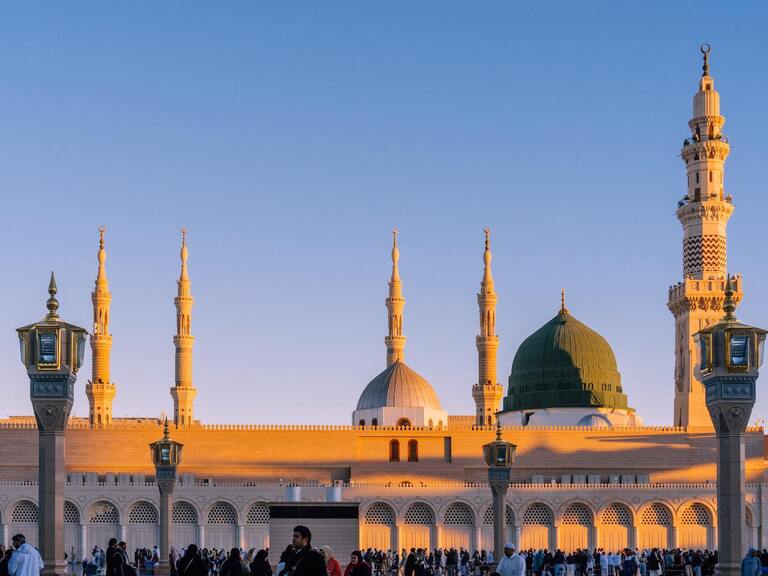An Anatomy of Turkish Foreign Policy: 1995 – 2020, Issue #10: Turkey and Saudi Arabia
Introduction
This study is the tenth bilateral analysis of Turkish Foreign Policy (TFP) in the research project titled: “An Anatomy of Turkish Foreign Policy.” Our goal is to quantify TFP’s evolution between 1995 and 2020 through a data-driven account free of speculative remarks. In this analysis, we will focus on the development of Turkey’s bilateral relations with Saudi Arabia. In doing so, we will begin with a quantitative analysis of the relations to provide an overview. Next, we will survey the notable events between the two countries that impacted bilateral relations.
Tha Data
We use data from the publicly available Lockheed Martin Advanced Technology Lab’s Integrated Crisis Early Warning System (ICEWS) event database in the present analysis. We discuss the methodology in Issue #1 of this series.[1] In brief, ICEWS features information on directed dyadic interactions between countries (i.e., Turkey and Saudi Arabia), where each observation includes details of who (source) did what (action) to whom (target), when (time), and where (location). Each interaction is then assigned an intensity score that ranges between -10 and +10 based on the category of the interaction. Negative interaction intensity scores imply conflict, and positive interaction intensity scores indicate cooperation. We calculate monthly and annual averages of the intensity scores to form indices.
Turkey–Saudi Arabia Relations: An Overview
How frequently does Turkey interact with Saudi Arabia, and what is the nature of its interactions? In Issue #1 we demonstrate that, Saudi Arabia is among the top thirty partners of Turkey by interaction frequency (ranking 19th). The aggregate interaction frequency suggests that the total is the fourteenth highest between January 1st, 1995, and April 30th, 2020. ICEWS features 2310 observations with Saudi Arabia within this timeframe, of which 660 are unique interactions.[2] This number corresponds to slightly above one percent of Turkey’s total interactions of 186,255. Table 3.1 below compares the summary statistics of Turkey’s directed dyadic interaction intensity scores with Saudi Arabia and the rest of the World.

The summary statistics in Table 3.1 provides a good overview of the overall interactions’ essence. The higher average intensity score of 1.6 between Turkey and Saudi Arabia compared to the 1.34 between Turkey and the World suggests that Turkey’s relations with Saudi Arabia vis-à-vis the World were, on average, slightly more cooperative throughout the last two and a half decades. This difference can also be qualitatively captured by exploring the shapes of the distributions. Figure 3.1 and Figure 3.2 below are event intensity score distributions. In both distributions, any value to the left of 0 suggests a conflictual interaction and to the right suggests a cooperative interaction. We also include the results of a simple difference-in-means test in Table 3.2, which indicates a statistically significant difference in the average intensity of interactions towards Saudi Arabia compared to the World.
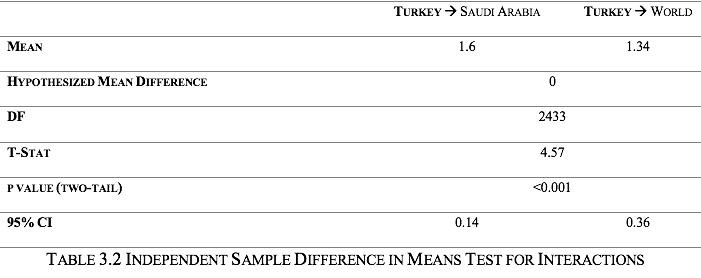
Looking at the relations between Turkey and Saudi Arabia exclusively, the summary statistics from Table 3.1 suggest the instances of cooperation between the two countries were slightly more than instances of conflict, given the negative skewness in the data’s distribution.
What was the variation in the frequency of bilateral interactions over time? Figure 3.3 below demonstrates the frequency of both cooperation and conflict initiations by Turkey toward Saudi Arabia by year. It should be noted that this figure does not take into account the magnitude of cooperation or conflict. Overall, the bilateral relations are defined cooperative interactions. The figure suggests the presence of three phases. The first phase between 1995 and 2002 is marked by low frequency in interaction initiation. The second phase, which spans 2002 and 2017, features an increase in frequency of cooperative interaction initiations. During this time, the frequency of conflict initiation remains low. The year of 2018 marks the start of the third phase with the assassination of the prominent Saudi journalist Khashoggi in Turkey and the subsequent deterioration in the relations.
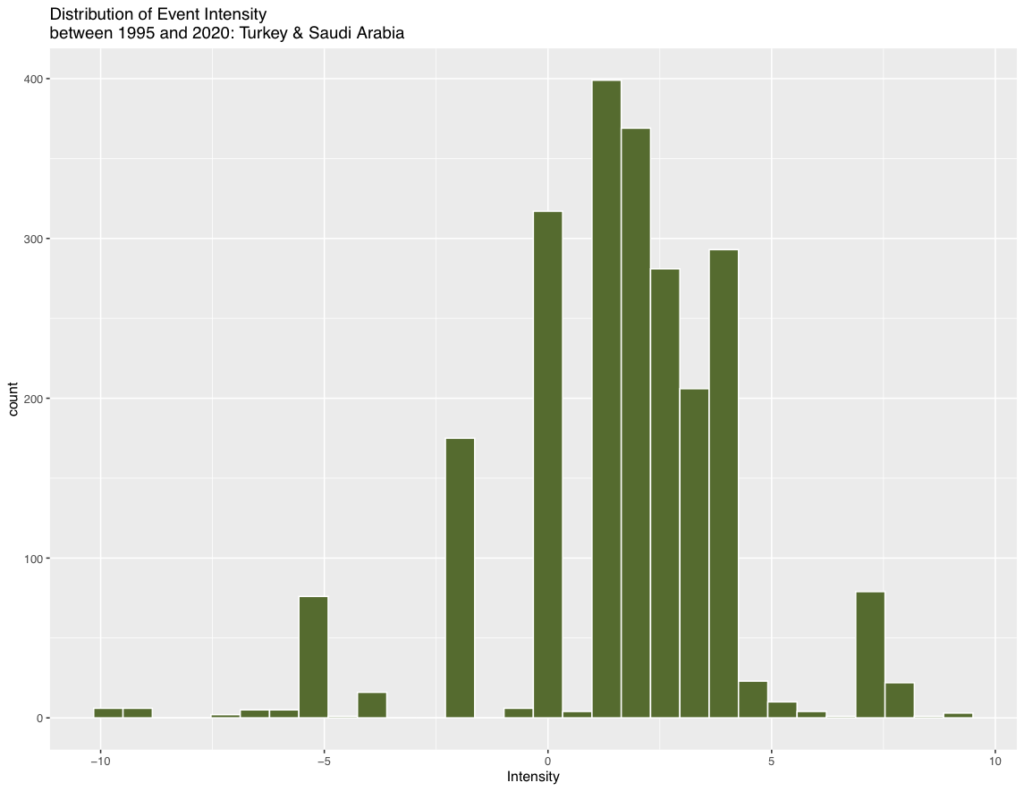
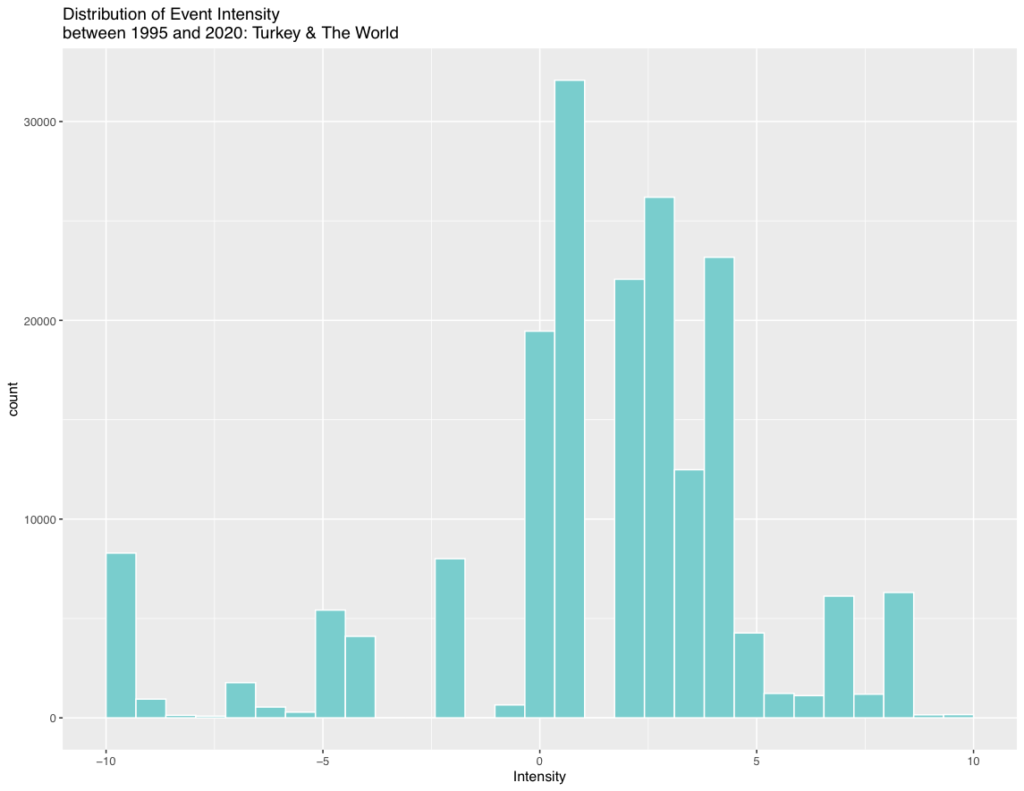
The disaggregation of interaction frequency by intensity over time provides further information. Figure 3.4 demonstrates the annual distributions of interactions. The distribution at the bottom displays the values for 1995 and the one at the top for 2020. As always, while 0 marks neutral events, any interactions that are located to the right of 0 are classified as instances of cooperation, and to the left are instances of conflict. The magnitude of interaction intensity increases as it approaches the minimum and maximum values (10 and -10). The figure remains steady overall until 2018 with most interactions on the right side of the 0 mark. In accordance with the previous figure, the distributions begin shifting leftward following 2018. Figure 3.5 demonstrates the variation in relations during a given government.[3] Interaction frequency was constant but low between the 59th and the 62nd governments. The 63rd government marked a gradual decline in interaction initiations until the 66th, which not only experienced the highest count in interactions but also the highest level of tension in the history of the bilateral relations.
States actively react to signals that they receive from their counterparts and adjust their foreign policy towards them. An index can be particularly useful for understanding the overall evolution of the signals in bilateral relations. Our most noteworthy contribution in this report is the index of bilateral relations between Turkey and Saudi Arabia. We present the index in Figure 3.6.
To draw our overall dyadic relations index, we begin with calculating a simple monthly intensity average of all interactions for a given month. The values of these averages are displayed with the black dots in Figure 3.6. A dot above zero suggests that the interactions for the month were cooperative, and a dot below suggests otherwise. Next, we move on to the trendlines. An upward-pointing trendline suggests an improvement in the bilateral relations and an increase in cooperation, whereas a downward-pointing trendline suggests growing discord, regardless of its color. We first focus on the short-term trends and calculate a six-month moving average. This line shows the average intensity scores considering the preceding six months and is displayed with the red line in Figure 3.6. This trendline describes the short-term cascades in which the two countries interact with each other. Finally, we turn to the long-term and fit a non-parametric locally weighted smoothing line among all the monthly averages, which is displayed with the blue line in Figure 3.6. The grey band around the blue line shows the 95% confidence intervals. This line captures the trend in the long-term evolution of bilateral relations between Turkey and Saudi Arabia. Parallel to findings above, the line suggests steady and positive interactions between 1995 and 2017 and begins a steep decline following 2018.


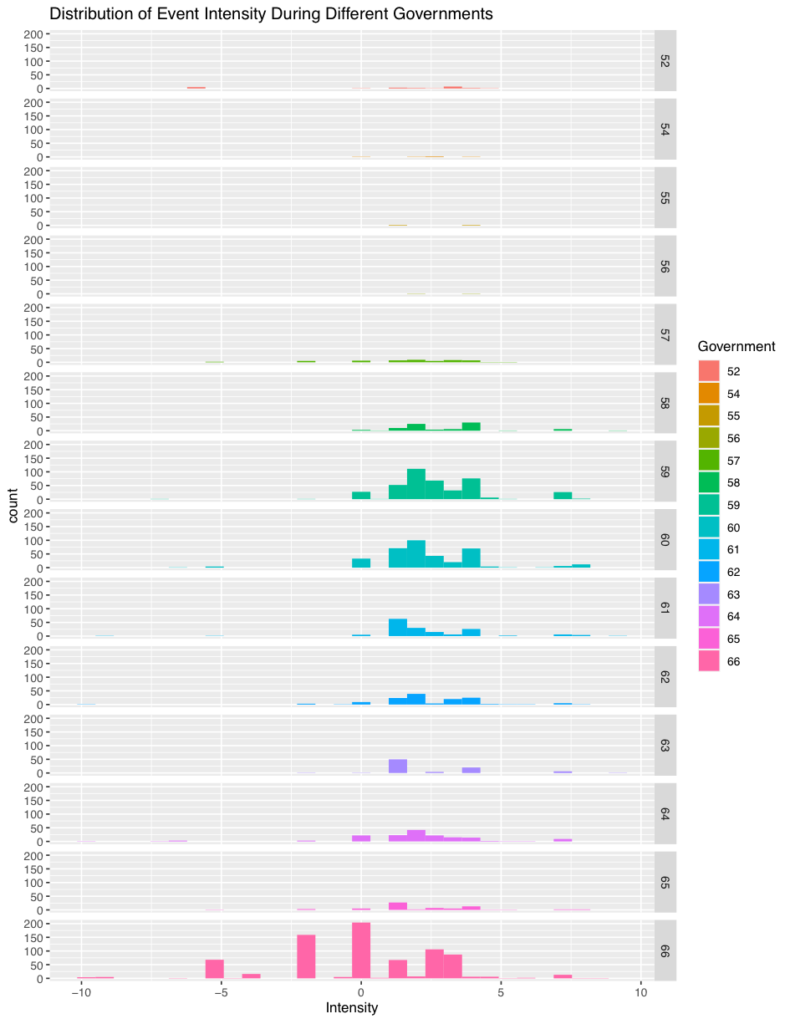
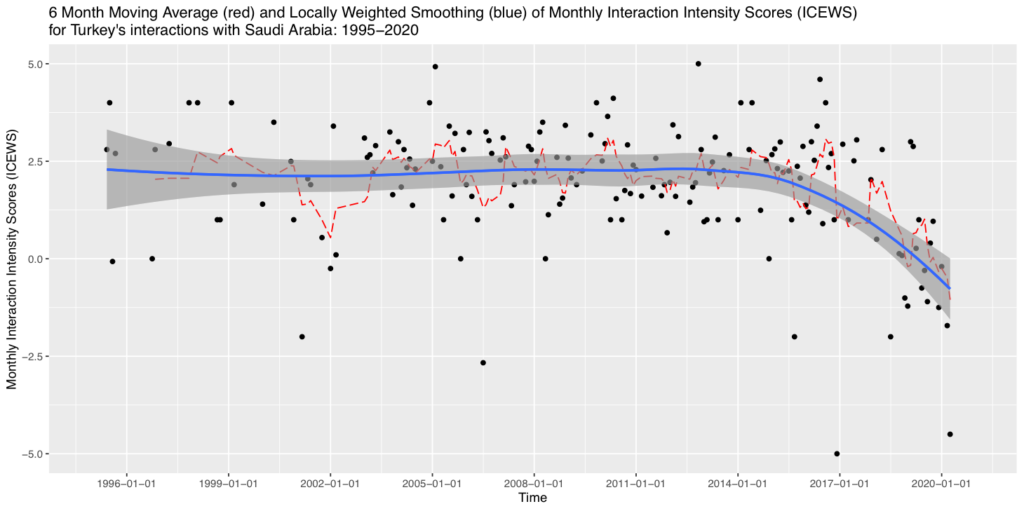
Defining Moments in Turkey-Saudi Arabia Relations
What are the momentous events that defined the relations between Turkey and Saudi Arabia? In this section, we focus on the milestones that defined the bilateral relations within the past two and a half decades between the two countries. We use the ICEWS intensity variable for filtering individual milestone interactions. Figure 3.7 presents a summary of the significant interactions.
Demirel’s visit to Saudi Arabia, 25 – 29 January 1993
Turkish Prime Minister Suleyman Demirel, Turkish State Minister Cavit Caglar, Turkish Ministry of Foreign Affairs Hikmet Cetin and Turkish Agricultural Minister Necmettin Cevheri visited Saudi Arabia to improve bilateral relations.[4] [SOURCE]
The Middle East Peace Tour, 11 January 2003
Prime Minister Abdullah Gul and State Minister Kursat Tuzmen visited Saudi Arabia, Syria, Egypt and Jordan. Referring to his visit to different countries in the Middle East that are in conflict, Prime Minister noted, “we are doing an active diplomacy for peace.” [SOURCE]
Establishment of the Turkish-Saudi Business Council, 11 October 2003
The Turkish-Saudi Business Council was established in Jeddah. [SOURCE]
Joint Economic Commission (JEC) Meeting, 4 – 6 November 2003
Turkey and Saudi Arabia held 11th meeting of the Joint Economic Commission in Ankara. [SOURCE]
Turkish-Saudi Business Council Endorsement, 18 January 2004
Prime Minister Recep Tayyip Erdogan attended the TOBB-DEIK Business Council dinner in Jeddah and delivered a speech addressing Turkish and Saudi businesspersons. He expressed his support to the Turkish-Saudi Business Council in the development of economic and commercial relations between Turkey and Saudi Arabia. [SOURCE]
Political Consultations, 21 April 2004
Saudi Arabian Foreign Minister Prince Saud Al Faisal visited Turkish Foreign Minister Abdullah Gul and Prime Minister Recep Tayyip Erdogan. The parties decided to deepen the political consultations on Middle Eastern policies. [SOURCE]
Executive Visit, 9 September 2005
Prime Minister Recep Tayyip Erdogan travelled to Jeddah to pay an official visit to Saudi Arabia that formed the stage for the Saudi King’s Turkey visit forty years later in 2006. [SOURCE]
Saudi King’s Turkey visit after 40 Years, 8 August 2006
King Abdullah Bin Abdulaziz Al Saud of Saudi Arabia made an official visit to Turkey for the first time in forty years upon the invitation of Turkish President Ahmet Necdet Sezer. Foreign Minister and Deputy Prime Minister Abdullah Gul also welcomed King Abdullah. The visit of King Abdullah bin Abdulaziz of Saudi Arabia was interpreted as an important opportunity to strengthen the two countries’ economic relations and attract Arab investors to Turkey. [SOURCE]
The Ministers of Interior Meeting, 15 September 2006
Minister of Interior Abdulkadir Aksu went to Saudi Arabia to attend the Meeting of Ministers of Interior of countries neighboring Iraq. At the meeting, the security of Iraq and Turkey’s approaches to security in the Middle East were presented. [SOURCE]
The Jeddah Economic Forum, 23 February 2007
Prime Minister Recep Tayyip Erdogan visited Saudi Arabia to attend the Jeddah Economic Forum. At the forum, Turkey’s approach to regional problems in the Middle East and the economic relations of the Turkish-Arab World were discussed. [SOURCE]
King of Saudi Arabia Receives Turkish State Medal of Honor, 10 November 2007
King of Saudi Arabia Abdullah Bin Abdulaziz Al Saud was presented with the State Medal of Honor of the Republic of Turkey at a ceremony held at the Turkish Presidency. The two sides also signed an agreement on ‘’Avoiding Double Taxation and Preventing Tax Evasion” between the two countries. [SOURCE]
Saudi Arabia Investment Fund for Agricultural Land, 26 August 2008
Saudi Arabia reportedly planned to set up a fund of around $535 million to purchase farmland abroad. Saudi officials announced that this fund will purchase agricultural land in Turkey, Sudan, and Pakistan. [SOURCE]
On Gaza, 30 December 2008
Prime Minister Erdogan arranged a meeting with King Abdullah of Saudi Arabia in Riyadh in January to address attacks in Gaza. [SOURCE]
Health Cooperation Memorandum, 22 April 2008
Grand National Assembly of Turkey approved the “Memorandum of Understanding in the Field of Health between the Ministry of Health of the Republic of Turkey and the Ministry of Health of the Kingdom of Saudi Arabia.” [SOURCE]
Executive Visit to Riyadh, 3 January 2009
Prime Minister Recep Tayyip Erdogan met King of Saudi Arabia in Riyadh. Foreign Minister Ali Babacan attended the dinner given by King Abdullah in honor of Prime Minister Erdogan. [SOURCE]
Visit of the Saudi Arabian Naval Forces, 2009
The Commander of the Saudi Arabian Naval Forces, Vice Admiral Fahd bin Abdullah Bin Mohammed Al-Saud and the Speaker of the Shura Council, Abdullah Bin Mohammed Bin Ibrahim Al-Sheikh visited Turkey. [SOURCE]
The “King Faisal International Award”, 9 March 2010
Prime Minister Recep Tayyip Erdogan received the “King Faisal International Award” given by the King Faisal Foundation. [SOURCE]
Discussion on Energy Policy Coordination, 9 – 12 February 2012
Taner Yildiz, Minister of Energy and Natural Resources, met Ali Ibrahim al-Naimi, Minister of Petroleum and Mineral Resources of Saudi Arabia, in Saudi Arabia. Possible energy policy coordination between the two countries were discussed. [SOURCE]
Erdogan’s Efforts on the Syrian Issue, 10 April 2012
Prime Minister Recep Tayyip Erdogan visited Saudi Arabia to increase awareness in the Arab world regarding the Syrian issue. [SOURCE]
Polypropylene Plant Investment, 30 April 2012
Saudi Arabia’s Advanced Petrochemical Company announced to build a polypropylene production plant in Turkey in partnership with a local Turkish company. [SOURCE]
Turkish-Arab Cooperation Forum, 1 December 2012
Foreign Minister Davutoglu, Arab League Secretary-General Nebil al-Arabi, and ministers from fifteen countries participated a meeting at the Turkish Arab Forum. Consultations were held between the parties in the field of security and economy during the meetings. [SOURCE]
Defense Sector Cooperation Agreement, 21 May 2013
Foreign Ministers of Turkey and Saudi Arabia signed the Agreement on Cooperation in Defense Industry. [SOURCE]
On Prevention of Sectarian Conflict in Iraq, 18 June 2014
Foreign Minister Ahmet Davutoglu attended the 41st Meeting of the Council of Foreign Ministers of the Organization of Islamic Cooperation held in Jeddah. Foreign Minister Davutoglu demanded that the Islamic world make a joint call to prevent sectarian conflict in Iraq. [SOURCE]
On Defense Cooperation, 13 April 2015
Saudi Arabian Defense Minister Prince Mohammed bin Salman bin Abdulaziz received the Turkish Undersecretary of Defense Industries Ismail Demir and his accompanying delegation. During the meeting, “the latest developments in the region and ways to develop the military cooperation between the two countries” were discussed. [SOURCE]
Saudi Court Tried Turkish Citizens with the Death Penalty, 5 December 2016
Eighteen Turkish citizens living in Saudi Arabia were tried with the death penalty for drug possession. [SOURCE]
On The Endorsement of Palestinians, 27 December 2017
Prime Minister Binali Yildirim met the Saudi King to discuss Palestine issue. Parties stated that the Islamic world should act in unity for the protection of the rights of the Palestinians. Sides also emphasized that the resolution adopted by the UN General Assembly was recorded as a strong message for the international community. [SOURCE]
Assassination of Jamal Khashoggi in Istanbul, 2 October 2018
Saudi journalist Jamal Khashoggi was killed in the Consulate General of Saudi Arabia in Istanbul. President Erdogan stated that Turkey will try to shed light on the Khashoggi case and, if necessary, Turkey could bring the issue to the agenda of the international public by engaging the United Nations. [SOURCE]
Search Warrant, 8 October 2018
Turkey requested a search warrant from the Saudi Arabian Consulate in Istanbul for the missing Saudi journalist Jamal Khashoggi. Turkey’s Deputy Minister of Foreign Affairs Ambassador Sedat Onal invited the Ambassador of Saudi Arabia for collaboration on the case. [SOURCE]
Assassination of Khashoggi, 20 October 2018
Saudi Arabia admitted Khashoggi was killed at Saudi Arabian Consulate in Istanbul. [SOURCE]
Saudi Arabia’s Tourism Boycott to Turkey, 11 July 2019
Saudi Arabia called for a tourism boycott to Turkey after Turkey’s investigations to enlighten the murder of Jamal Khashoggi. [SOURCE]
Washington Post Piece on the Assassination, 29 September 2019
Turkish President Erdogan published an article about Khashoggi for the Washington Post. He stated that he believes that justice for Khashoggi will be served only through the judgments of national and international courts. [SOURCE]
[iheu_ultimate_oxi id=”30″]
[1] Lautenschlager, Jennifer, Steve Shellman, and Michael Ward. 2015. “ICEWS Event Aggregations.” Harvard Dataverse V3.
[2] Notable events are captured by multiple news agencies leading to repetitions in the dataset.
[3] There are fifteen governments in our timeframe. The terms of these governments are as follows: the 52th Government of Turkey, October 30th, 1995, to March 6th, 1996; the 53th Government of Turkey, March 6th, 1996, to June 28th, 1996; the 54th Government of Turkey, June 28th, 1996, to June 30th, 1997; the 55th Government of Turkey, June 30th, 1997, to January 11th, 1999; the 56th Government of Turkey, January 11th, 1999, to May 28th, 1999; the 57th Government of Turkey, May 28th, 1999, to November 18th, 2002; the 58th Government of Turkey, November 19th, 2002, to March 12th, 2003; the 59th Government of Turkey, March 14th, 2003, to August 29th, 2007; the 60th Government of Turkey, August 29th, 2007, to July 6th, 2011; the 61th Government of Turkey, July 6th, 2011, to August 29th, 2014; the 62th Government of Turkey, August 29th, 2014, to August 28th, 2015; the 63th Government of Turkey, August 28th, 2015, to November 24th, 2015; the 64th Government of Turkey, November 24th, 2015, to May 24th, 2016; the 65th Government of Turkey, May 24th, 2016, to July 9th, 2018; the 66th Government of Turkey, July 10th, 2018 which is ongoing. We include the data for the 51st Government as part of the 52nd Government given its short term.
[4] The data of this article does not include the period before 1995. On the other hand, after Demirel’s 1993 visit to Saudi Arabia, Turkey did not officially visit Saudi Arabia until 2005. Demirel’s visit to Saudi Arabia in 1993 was added to the article even though the given data was not included because analysts considered this information necessary.
Fotoğraf: Sulthan Auliya

